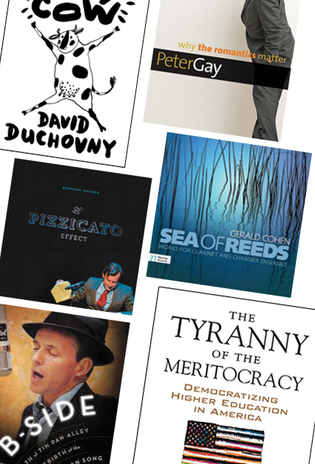 loading
loading
Arts & CultureOutputTo have your book, CD, app, or other work considered for Output, please send a copy to Arts Editor, Yale Alumni Magazine, PO Box 1905, New Haven CT 06509; or e-mail a copy or link to [email protected]. All works sent will be listed in “Works Received” in the online version of the next issue.  View full imageWhy the Romantics Matter Reading this brief book is like taking a walk through a museum with a superbly erudite art historian, informal but eloquent. Gay touches on the lives, beliefs, and achievements of a swath of romantic and modern artists and thinkers. He tells us, for example, about Nietzche’s use of “wit, lyricism, and vehemence” Flaubert’s malice against the bourgeois, so deep it amounted to a phobia; a possible reason for Wilde’s fatal failure to leave England after his first trial. This is a book with an arresting insight on almost every page.
Sea of Reeds The liner notes for this album begin “I have always loved the clarinet.” Cohen doesn’t need to spell that out. His passion for the instrument is evident in each of the four sections of this uplifting clarion call of an album. “Variously Blue” is a jazzy trio of clarinet, piano, and violin, while “Yedid Nefesh” (with viola instead of violin) is more laid-back and windswept. The song cycle “Sea of Reeds” and the 14-minute “Grneta Variations” go the traditional duet route, with two clarinets and piano. Religious themes abound, but what’s driving this music is a deep faith in that flexible, unpredictable instrument.
Holy Cow: A Novel One night, Elsie Bovary, a wise-cracking young milk cow living the farm life in upstate New York, inadvertently sees the “Box God” broadcasting a program about meat production. “The Event,” she calls it, “or the Revelation, or the Day the Patty Hit the Fan.” Together with a pig named Shalom (a recent convert to Judaism) and Tom, a suave turkey, she sets off on a journey to India, where cows are sacred. With Duchovny channeling her, Elsie is a witty animal, and although the book is probably aimed at teens, older humans will be entertained too.
The Tyranny of the Meritocracy: Democratizing Higher Education in America “We need to change our understanding of merit,” writes Guinier, the first black woman to be named a tenured law professor at Harvard and the head of the Justice Department’s Civil Rights Division. In a hard-hitting critique of modern higher education, Guinier draws on her work as a lawyer and law teacher to suggest that the current “testocracy,” which rewards highly competitive individuals who work alone, be replaced with a “culture of collaboration” in which “everybody works together.”
The B-Side: The Death of Tin Pan Alley and the Rebirth of the Great American Song Between the 1920s and 1950s, the collection of sophisticated, superbly crafted, and innovative standard songs that would make up the so-called Great American Songbook emerged from the piano-pounding din of Manhattan’s Tin Pan Alley and the area around the Brill Building. Yagoda offers an equally well-crafted look at the songbook’s evolution and main players, from Cole Porter to Mitch Miller, and notes that while “the final page [has] been turned on one songbook,… another [is] just starting to be written.”
The Pizzicato Effect Hughes’s intellectual, lecture-style comedy may best be appreciated live, when you can marvel at his nimble mind. On disc, such routines can seem random—yet they are still bracingly smart and silly. There is more than one reference to Hughes’s time at the Yale School of Drama, including, in the title track: “My undoing as a stage director was the fact that directing is about the guidance you don’t provide.” Hughes throws in references to Mozart, Kant, Japanese calligraphy, and game theory, and has such a special interest in the Greek concept of omphalos that he’s written it into a theme song.
The comment period has expired.
|
|